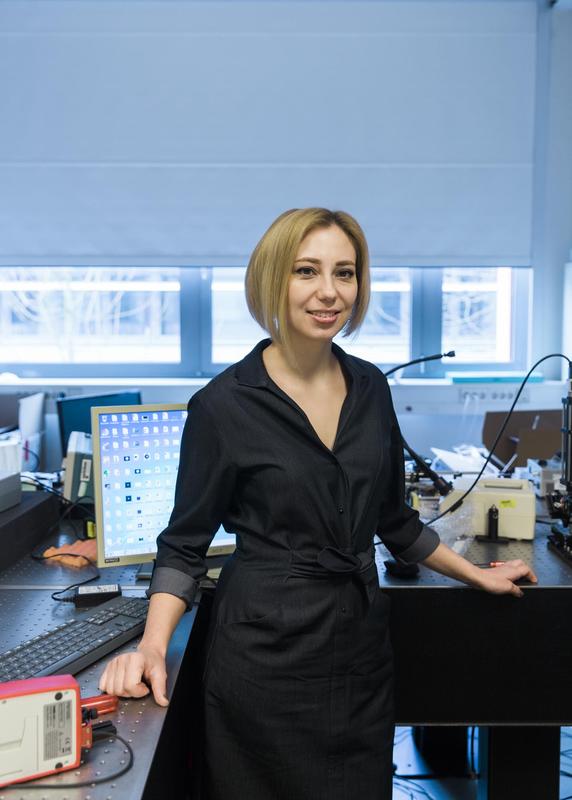Better detecting cancer with ultrashort flashes of light: New junior research group at Leibniz IPHT

Dr. Maria Chernysheva leads the junior research group "ultrafast fiber lasers" Sven Döring
From Moscow via Birmingham to Jena: For Dr. Maria Chernysheva, Leibniz IPHT as the new stage of her scientific career means more than a geographical change. For the young engineer, her new position as a head of the junior research group for ultrafast lasers also marks a turning point in her professional pathway.
“Throughout my research career, I was developing lasers. After successful publication of its performance or phenomena discovered, the laser was put on the top shelf, where it got dusted or disassembled in favor of new laser setups.”
Such routine made her skeptical about her research, and so she decided to change her approach. „I started looking for application ideas or collaborations with other areas of research, such as sensing and medicine.“
Following this concept, Maria Chernysheva established a collaboration with the Medical School at Aston University, where she worked before moving to Jena in January 2019, to develop effective laser instruments for cardio surgery.
Her objective: New lasers for cancer research
For the scientist, the new station at one of the leading research institutes in the field of optical health technologies is a consistent choice: “The focus of Leibniz IPHT on the research of photonic systems as tools for medicine, life and environmental sciences ideally matches my own primary research interest.“
Plus, the institute was already familiar to Maria Chernysheva as she was one of the participants of the international career workshop “Women in Photonics” at Leibniz IPHT in April 2018. “I really like the idea of having a full circle of technology: from fiber preform fabrication through laser and other photonic system development to real-world applications of these systems.
„This last bit — the application of developed lasers — was missing in both of my previous institutions“, Dr. Chernysheva adds. „This makes IPHT very advantageous. I would say that such a combination is extremely unique and stands out IPHT among other institutions.“
With her junior research group, Maria Chernysheva aspires to bring forward a new step in ultrafast fiber lasers to open up the field of the mid-infrared generation. The telecommunications engineer, who received her doctorate in Laser Physics in 2014 at the Fiber Optics Research Center of the Russian Academy of Sciences in Moscow, is thus expanding the wavelength range researched in Jena. She aims at establishing a new field of laser systems used in infrared spectroscopy for cancer diagnostics.
“This will mainly target 2 micrometer and Mid-IR ultrafast fibre laser development for the application in spectroscopy — for example for cancer diagnostics — or surgery.“ Most recently, Maria Chernysheva worked on the development of femtosecond mid-infrared fiber lasers at Aston University where she was funded with the Engineering for Development fellowship from the Royal Academy of Engineering and designed instruments for a non-invasively assessment of the biochemical content of tissues.
Ultrafast lasers are lasers emitting ultra-short light pulses. “Ultra-short” means that the light pulses can be shorter than one trillionths second. “Due to high duty factor, such lasers became a working horse for all applications requiring both high power sources and preciseness, such as micro- and even nanomachining or surgery,” explains Maria Chernysheva.
Emerging and rapidly developing applications are not limited by optical frequency conversion, and include optical storage and three-photon microscopy, which is particularly of interest for neuroscientists for imaging the work of living cells.
By setting up junior research groups, Leibniz IPHT supports excellent young scientists by giving them the opportunity to establish a promising research topic within the research profile of the institute. For example, former junior research group leader Prof. Ute Neugebauer — today deputy scientific director —now leads the research group „Clinical Spectroscopic Diagnostics“ within the research and treatment centre “Center for Sepsis Control and Care” of Jena University Hospital.
Together with her team, Prof. Neugebauer researches on new tools to enable better treatment of sepsis in the future. Professor Torsten Frosch also established himself at Leibniz IPHT with his former junior research group on fiber spectroscopic sensor technology. He and his team are investigating novel optical sensor fibers for the spectroscopic analysis of gases and antibiotics helping e.g. physicians to determine whether patients with a severe infection are treated with a sufficient dose of antibiotics.
Dr. Maria Chernysheva, Junior Research Group Leader “Ultrafast Fiber Lasers”
+49 (0) 3641 · 206-312
maria.chernysheva(a)leibniz-ipht.de
https://www.leibniz-ipht.de/en/institute/presse/news/detail/krebs-erkennen-mit-u…
Media Contact
All latest news from the category: Medical Engineering
The development of medical equipment, products and technical procedures is characterized by high research and development costs in a variety of fields related to the study of human medicine.
innovations-report provides informative and stimulating reports and articles on topics ranging from imaging processes, cell and tissue techniques, optical techniques, implants, orthopedic aids, clinical and medical office equipment, dialysis systems and x-ray/radiation monitoring devices to endoscopy, ultrasound, surgical techniques, and dental materials.
Newest articles

NASA: Mystery of life’s handedness deepens
The mystery of why life uses molecules with specific orientations has deepened with a NASA-funded discovery that RNA — a key molecule thought to have potentially held the instructions for…

What are the effects of historic lithium mining on water quality?
Study reveals low levels of common contaminants but high levels of other elements in waters associated with an abandoned lithium mine. Lithium ore and mining waste from a historic lithium…

Quantum-inspired design boosts efficiency of heat-to-electricity conversion
Rice engineers take unconventional route to improving thermophotovoltaic systems. Researchers at Rice University have found a new way to improve a key element of thermophotovoltaic (TPV) systems, which convert heat…



